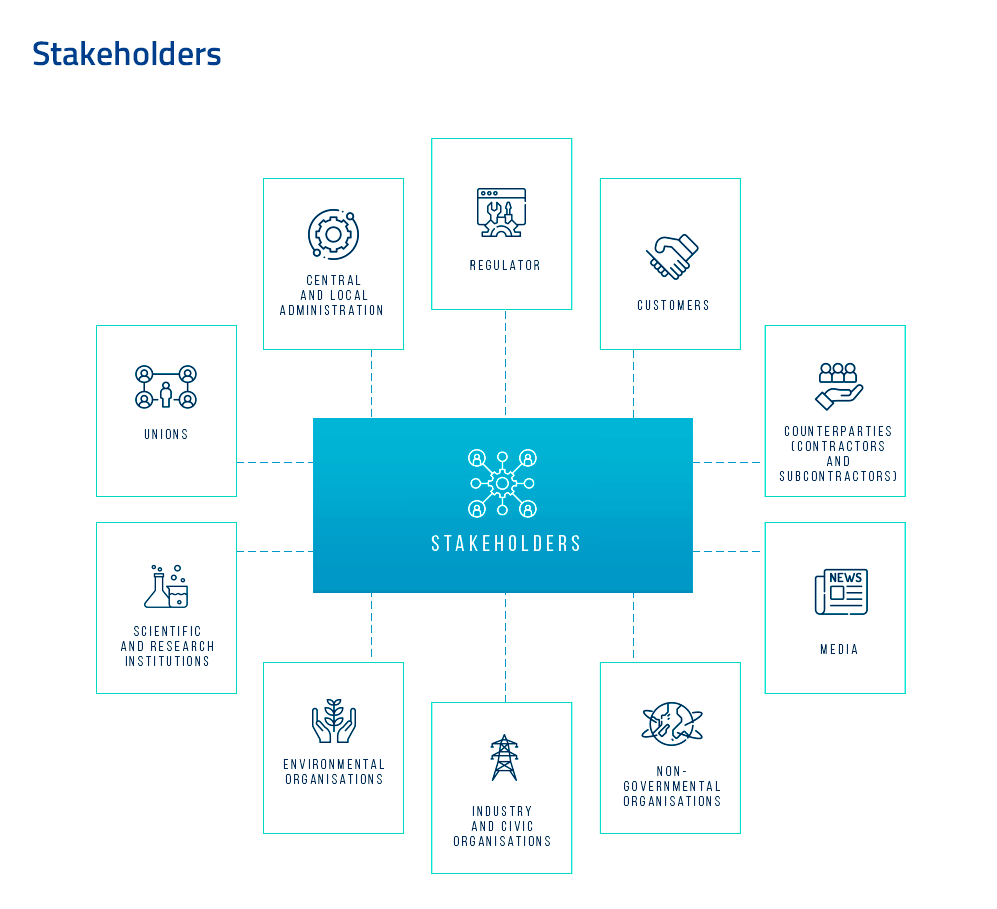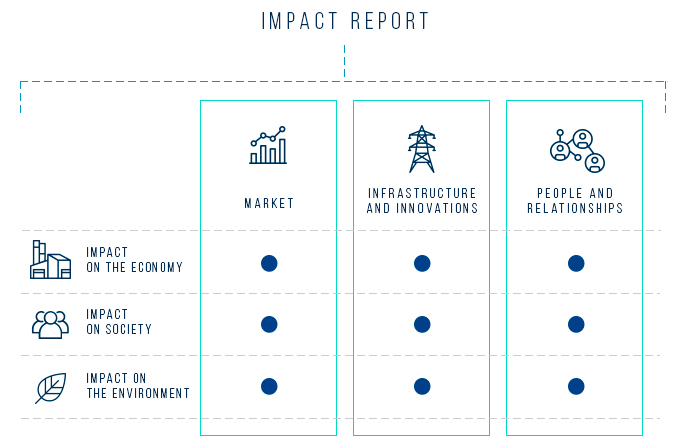The report was written in accordance with the guidelines included in the IIRC and GRI Standards.
We understand impact reporting as a disclosure of complete, reliable and transparent data to stakeholders on the company's economic, market, social and environmental impact. The information is compiled based on selected impact indicators, Global Reporting Initiative Standards (GRI) and our own standards, using the indicator calculation methods and taking into account the market situation.
The main objectives of the publication are to show the challenges faced by PSE and the entire power sector, and to present the measures taken by the company to face these challenges, in particular with regard to the implementation of new and continued strategic initiatives. We also wanted to show the scale of the PSE's impact on the social and economic environment, to meet the expectations of stakeholders in terms of presenting the expected financial and non-financial issues, and to increase the transparency of our company.
GRI 102-54
Chapter title: We have prepared the report on the PSE’s impact on the market and economy according to a methodology developed by an external expert based on the Wassily Leontief model, also called the inter-industry flow model or Input-Output model. This method focuses on examining the relationship between industries and companies. The model is based on the most recent inter-industry flow tables at the current base prices for domestic output in 2010, published by the Central Statistical Office in 2014. We used three key areas to show how our business impacts the economy and the society: added value, jobs and wages.
PSE’S IMPACT ON THE POLISH ECONOMY IN 2020


2,78 bn
value added

2 627
jobs

more than PLN 234 m
wages

more than 2,1 bn
value added

8 529
jobs

more than PLN 380 m
wages

PLN 827 m
value added

4 265
jobs

more than PLN 159 m
wartość wages

PLN 843 m
value added

2 536
jobs

more than PLN 142 m
wages
As regards the indicators, we report the data for 2019–2020, and even the data in a four-year perspective to show the trends that have occurred as a result of a number of changes that have taken place within the organization, processes implemented and standards improved every year.
We have made a commitment to publish successive reports every year as integrated reports enhanced with impact indicators.
- an analysis of our company's responsibility towards the economy and the market, the society and the employees as well as the natural environment and the climate,
- a review of global challenges for the power sector,
- an analysis of the reporting trends in foreign and domestic power companies,
- PSE's accepted standards for integrated reporting,
- a review of the previously reported issues,
- an analysis of key impact indicators, GRI indicators and PSE's own indicators,
- a review of documents defining the challenges for business in the context of sustainable development – Sustainable Development Objectives,
- an analysis of internal documents.
GRI 102-42
GRI 102-43

In the course of internal meetings and consultations with PSE’s organizational units, we confirmed the materiality matrix containing the key topics to be reported and the concept of the report structure.

Materiality matrix
- towards the market,
- at the workplace,
- towards the society,
- towards the natural environment.
5
4
Outside perspective
3
Anti-corruption efforts ─ measures taken to eliminate cases of corruption (communication and training on anti-corruption policies and procedures)
Measures for reliable and economic operation of the power system to ensure long-term security of electricity supply (prevention of a blackout risk)
Conducting more Capacity Market processes
Transmission system development and Poland's Energy Policy
Integration of the Polish market with European markets
Ensuring IT and technical security of the power system
Ethics and transparency in the relations with business partners (including tenders)
Strengthening innovation and implementing new technologies
Presentation of actions taken by PSE to adapt the NPS to the new shape of markets and new technologies (including energy storage methods, distributed generation – energy from renewable sources)
PSE's energy efficiency efforts, including ways to reduce energy consumption in the company and as part of its operations
Responsibility towards the natural environment in implementation of investment projects, including preservation of biodiversity in the project areas
PSE's carbon footprint
Risks and opportunities resulting from climate change
Reducing the PSE's environmental impact resulting from the company’s operations
The approach to managing employee health and safety at PSE
Diversity and equal opportunity in access to positions/jobs, including the management board; equal pay for men and women
Adaptability of the company: know-how, structures and internal procedures prepared for rapid changes in the electricity market
Winning public acceptance for line routes (including obtaining utility easements) and public communication concerning investment projects
Minimization of the negative social impact of the implemented investment projects (noise, interference with the landscape)
Investments in regional development
Flagship community projects of PSE
Good practices and standards of living and functioning in the vicinity of power lines
Promoting knowledge about energy security and educational programs implemented
PSE operations vs. transmission tariff and electricity bills
PSE's impact on the national economy and public finances
Structure of the power system in Poland and the role of PSE
Improvement of the implement model for infrastructure investment projects, including implementation of investment tasks resulting from the Transmission Network Development
Modernization of methods and tools to support the zonal balancing market
Risk management at PSE, including the tools used
PSE Capital Group Cybersecurity Program
Cooperation with local governments
Requirements and standards for cooperation with contractors and subcontractors
The company's compliance with environmental laws and regulations
PSE's environmentally friendly initiatives, e.g. as part of the idea of the closed-loop economy
Creating a friendly and safe workplace (transparent salary system, clear promotion criteria, no discrimination, etc.)
Creating space for employee development (training and education, support for development, benefits)
Preventing violations of the employees’ right to organize and enter collective disputes
HSEQ work environment management model
Periodic evaluation of the company in terms of respect for human rights, training for employees on human rights, etc.
Actions taken by PSE in response to the COVID-19 pandemic
2
Company's perspective
3,5
5
Anti-corruption efforts ─ measures taken to eliminate cases of corruption (communication and training on anti-corruption policies and procedures)
Measures for reliable and economic operation of the power system to ensure long-term security of electricity supply (prevention of a blackout risk)
Conducting more Capacity Market processes
Transmission system development and Poland's Energy Policy
Integration of the Polish market with European markets
Ensuring IT and technical security of the power system/p>
Ethics and transparency in the relations with business partners (including tenders)
Strengthening innovation and implementing new technologies
Presentation of actions taken by PSE to adapt the NPS to the new shape of markets and new technologies (including energy storage methods, distributed generation – energy from renewable sources)
PSE's energy efficiency efforts, including ways to reduce energy consumption in the company and as part of its operations
Responsibility towards the natural environment in implementation of investment projects, including preservation of biodiversity in the project areas
PSE's carbon footprint
Risks and opportunities resulting from climate change
Reducing the PSE's environmental impact resulting from the company’s operations
The approach to managing employee health and safety at PSE
Diversity and equal opportunity in access to positions/jobs, including the management board; equal pay for men and women
Adaptability of the company: know-how, structures and internal procedures prepared for rapid changes in the electricity market
Winning public acceptance for line routes (including obtaining utility easements) and public communication concerning investment projects
Minimization of the negative social impact of the implemented investment projects (noise, interference with the landscape)
Investments in regional development
Flagship community projects of PSE
Good practices and standards of living and functioning in the vicinity of power lines
Promoting knowledge about energy security and educational programs implemented
PSE operations vs. transmission tariff and electricity bills
PSE's impact on the national economy and public finances
Structure of the power system in Poland and the role of PSE
Improvement of the implement model for infrastructure investment projects, including implementation of investment tasks resulting from the Transmission Network Development
Modernization of methods and tools to support the zonal balancing market
Risk management at PSE, including the tools used
PSE Capital Group Cybersecurity Program
Cooperation with local governments
Requirements and standards for cooperation with contractors and subcontractors
The company's compliance with environmental laws and regulations
PSE's environmentally friendly initiatives, e.g. as part of the idea of the closed-loop economy
Creating a friendly and safe workplace (transparent salary system, clear promotion criteria, no discrimination, etc.)
Creating space for employee development (training and education, support for development, benefits)
Preventing violations of the employees’ right to organize and enter collective disputes
HSEQ work environment management model
Periodic evaluation of the company in terms of respect for human rights, training for employees on human rights, etc.
Actions taken by PSE in response to the COVID-19 pandemic
The colors reflect the areas:
Relevant
Less relevant
Company’s` perspective – internal stakeholders (survey results and internal consultations).

| Responsibility towards the market | ||
|---|---|---|
| 1 | Anti-corruption efforts – measures taken to eliminate cases of corruption (communication and training on anti-corruption policies and procedures) | |
| 2 | Measures for reliable and economic operation of the power system to ensure long-term security of supply* | |
| 3 | Conducting more Capacity Market processes | |
| 4 | Transmission system development and Poland's Energy Policy | |
| 5 | Integration of the Polish market with European markets | |
| 6 | Ensuring IT and technical security of the power system | |
| 7 | Ethics and transparency in the relations with business partners (including tenders) | |
| 8 | Strengthening innovation and implementing new technologies | |
| 9 | Presentation of actions taken by PSE to adapt the NPS to the new shape of markets and new technologies (including energy storage methods, distributed generation – energy from renewable sources) | |
| Responsibility towards the natural environment | ||
| 10 | PSE's energy efficiency efforts, including ways to reduce energy consumption in the company and as part of its operations | |
| 11 | Responsibility towards the natural environment in implementation of investment projects, including preservation of biodiversity in the project areas | |
| 12 | PSE's carbon footprint | |
| 13 | Risks and opportunities resulting from climate change | |
| 14 | Reducing the PSE's environmental impact resulting from the company’s operations | |
| Responsibility at the workplace | ||
| 15 | The approach to managing employee health and safety at PSE | |
| 16 | Diversity and equal opportunity in access to positions/jobs, including the management board; equal pay for men and women | |
| 17 | Adaptability of the company: know-how, structures and internal procedures prepared for rapid changes in the electricity market | |
| Responsibility towards the society | ||
| 18 | Winning public acceptance for line routes (including obtaining utility easements) and public communication concerning investment projects | |
| 19 | Minimization of the negative social impact of the implemented investment projects (noise, interference with the landscape) | |
| 20 | Investments in regional development | |
| 21 | Flagship community projects of PSE | |
| 22 | Good practices and standards of living and functioning in the vicinity of power lines | |
| 23 | Promoting knowledge about energy security and educational programs implemented | |
| 24 | PSE operations vs. transmission tariff and electricity bills | |
| Responsibility towards the market | ||
|---|---|---|
| 25 | PSE's impact on the national economy and public finances | |
| 26 | Structure of the power system in Poland and the role of PSE | |
| 27 | Improvement of the implement model for infrastructure investment projects, including implementation of investment tasks resulting from the Transmission Network Development | |
| 28 | Modernization of methods and tools to support the zonal balancing market | |
| 29 | Risk management at PSE, including the tools used | |
| 30 | PSE Capital Group Cybersecurity Program | |
| 31 | Cooperation with local governments | |
| 32 | Requirements and standards for cooperation with contractors and subcontractors | |
| Responsibility towards the natural environment | ||
| 33 | The company's compliance with environmental laws and regulations | |
| 34 | PSE's environmentally friendly initiatives, e.g. as part of the idea of the closed-loop economy | |
| Responsibility at the workplace | ||
| 35 | Creating a friendly and safe workplace (transparent salary system, clear promotion criteria, no discrimination, etc.) | |
| 36 | Creating space for employee development (training and education, support for development, benefits) | |
| 37 | Preventing violations of the employees’ right to organize and enter collective disputes | |
| 38 | HSEQ work environment management model | |
| 39 | Periodic evaluation of the company in terms of respect for human rights, training for employees on human rights, etc. | |
| 40 | Actions taken by PSE in response to the COVID-19 pandemic | |
| Topics defined as important | Topics as part of the GRI standards | Impact topic within the organization | Impact of the topic outside the organization |
|---|---|---|---|
| Responsibility towards the market | |||
| Anti-corruption efforts – measures taken to eliminate cases of corruption (communication and training on anti-corruption policies and procedures) | Prevention of corruption | PSE S.A. | Particularly relevant to contractors and subcontractors |
| Measures for reliable and economic operation of the power system to ensure long-term security of supply* | Indirect economic impact | PSE S.A. | Particularly relevant to customers |
| Conducting more Capacity Market processes | Indirect economic impact | PSE S.A. | Particularly relevant to customers |
| Transmission system development and Poland's Energy Policy | Strategy | PSE S.A. | Particularly relevant to the regulatory authorities, customers, contractors and subcontractors |
| Integration of the Polish market with European markets | Strategy | PSE S.A. | Particularly relevant to the regulatory authorities, customers, contractors and subcontractors |
| Ensuring IT and technical security of the power system | Strategy | PSE S.A. | Particularly relevant to the regulatory authorities, customers, contractors and subcontractors |
| Ethics and transparency in the relations with business partners (including tenders) | Ethics and integrity Procurement practices |
PSE S.A. | Particularly relevant to contractors, subcontractors and suppliers |
| Strengthening innovation and implementing new technologies | Strategy | PSE S.A. | Particularly relevant to customers |
| Presentation of actions taken by PSE to adapt the NPS to the new shape of markets and new technologies (including energy storage methods, distributed generation – energy from renewable sources) | Strategy | PSE S.A. | Particularly relevant to the owner, the electricity market participants, as well as RES and environmental and social organizations |
| Responsibility towards the natural environment | |||
| PSE's energy efficiency efforts, including ways to reduce energy consumption in the company and as part of its operations | Impact on climate | PSE S.A. | Particularly relevant to the employees, the owner as well as environmental and social organizations |
| Responsibility towards the natural environment in implementation of investment projects, including preservation of biodiversity in the project areas | Compliance with environmental regulations Biodiversity |
PSE S.A. | Particularly relevant to local communities |
| PSE's carbon footprint | Emissions Impact on climate |
PSE S.A. | Particularly relevant to the owner, the employees as well as environmental and social organizations |
| Risks and opportunities resulting from climate change | Impact on climate | PSE S.A. | Particularly relevant to the owner, the regulatory authorities, the electricity market participants and the employees |
| Reducing the PSE's environmental impact resulting from the company’s operations | Impact on climate Compliance with environmental regulations |
PSE S.A. | Particularly relevant to the employees, local communities as well as environmental and social organizations |
| Responsibility at the workplace | |||
| The approach to managing employee health and safety at PSE | Occupational Health and Safety | PSE S.A. | Particularly relevant to the employees and potential employees |
| Diversity and equal opportunity in access to positions/jobs, including the management board; equal pay for men and women | Diversity and equal opportunities | PSE S.A. | Particularly relevant to the employees and potential employees |
| Adaptability of the company: know-how, structures and internal procedures prepared for rapid changes in the electricity market | Employment Compliance with regulations |
PSE S.A. | Particularly relevant to potential employees and the regulatory authorities |
| Responsibility towards the society | |||
| Winning public acceptance for line routes (including obtaining utility easements) and public communication concerning investment projects | Local community | PSE S.A. | Particularly relevant to local communities |
| Minimization of the negative social impact of the implemented investment projects (noise, interference with the landscape) | Local community | PSE S.A. | Particularly relevant to local communities |
| Investments in regional development | Local community | PSE S.A. | Particularly relevant to local communities |
| Flagship community projects of PSE | Local community Sponsorship |
PSE S.A. | Particularly relevant to local communities |
| Good practices and standards of living and functioning in the vicinity of power lines | Local community Customer health and safety |
PSE S.A. | Particularly relevant to local communities |
| Minimization of the negative social impact of the implemented investment projects (noise, interference with the landscape) | Compliance with environmental regulations | PSE S.A. | Particularly relevant to local communities |
| Promoting knowledge about energy security and educational programs implemented | Indirect economic impact | PSE S.A. | Particularly relevant to local communities |
| PSE operations vs. transmission tariff and electricity bills | Indirect economic impact | PSE S.A. | Particularly relevant to the society |
GRI 102-11
GRI 102-56
